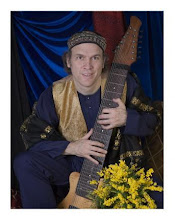From an article first published in India Currents
The Liner notes of the recent Navras DVD Songs of the Mystics assert that Abida Parveen is “The only woman allowed to sing at the shrines of the Sufi saints.” There must be a story behind this, I thought. I was sure there must have been public denunciations of her by fundamentalist mullahs, which were answered in turn by Sufi mystics and music lovers, resulting in her being carried into the shrines on the shoulders of triumphant well-wishers. I thought that all I would have to do is line up the positive and negative quotes, and I’d have a great story about the triumph of common sense, art, and genuine religious feeling. The problem with this speculation was that this woman seemed to be as universally popular as the Dalai Lama. I couldn’t find anybody who criticized her, even on the most conservative Moslem websites, except for one polite suggestion that she wear a headscarf. Even more remarkable, she had been trained by Khyal vocalist Salamat Ali Khan. How was this woman able to change the mind of a man who for many years had refused to give musical instruction to his own daughter, who would grow up to become the popular Pakistani vocalist Riffat Sultana?
The answer turned out to be far more complicated than it first appears. Riffat informed me that her father’s early refusal to teach her had nothing to do with Islam. “There are some families that permit woman to sing and others that don’t,” she said. “My mother sang for friends and family, and she was very good. But my family gharana was a lineage of male singers, so we women were not permitted to sing in public.” And yet, the Navras DVD liner notes say that Parveen’s father also came from a lineage of male singers. Despite this, he had designated her as his musical successor when she was five years old, even though he had eligible male relatives. Apparently these rules, like most other South Asian traditions, can be bent or broken when necessary. Does this make it possible for women to express themselves in a culture that Westerners see as male-dominated?
The beginnings of an answer can be found in The Female voice in Sufi Ritual by Bengali Anthropologist Shemeen Burney Abbas. According to Abbas, some dargahs (Sufi shrines), do forbid women to sing. However, most dargahs permit women to sing for other women, many dargahs permit them to perform for everyone on special occasions, and many dargahs permit woman to perform regularly for everyone. There is in fact, a whole class of women who make their living by singing at dargahs for alms. They perform in a style called Sufiana-kalam, which is both similar to and significantly different from the male-dominated Qawwali. Both forms derive their texts from the teachings of the great Sufi mystics. But Qawwali usually begins with an invocation in Arabic or classical Persian before switching to a vernacular language such as Sindi or Punjabi. Sufiana-Kalam is sung in the local vernacular throughout. Qawwali singers create complicated improvisations. Sufiani-Kalam sticks to a well-known folk melody sung solo or in group unison. Qawwali is thus a sophisticated elitist form that makes room for artistic virtuosity, whereas Sufiani-Kalam is a folk form sung mostly by the poor and uneducated. The main reason that women of certain families are not allowed to sing thus appears to be a very non-Islamic one. Even though Islam officially rejects the caste system, people everywhere don’t like to be associated with those on the bottom of the economic ladder.
Abida Parveen’s studies of Khyal and Qawwali have enabled her to transform Sufiani-Kalam to a new level of improvised artistic virtuosity. Although not the first woman to sing in dargahs, her artistic innovations have made her the first to be treated with this kind of respect and reverence. She also performs her own unique versions of ghazals, qawwali, and other traditionally male-dominated styles, in ways which can be seen as truer to the original intentions of the poetry. Because the word “Islam” literally means submission, the great Sufi mystics believed that the essence of Islamic worship was visible in the lives of women, who regularly submit to the demands of husband and family. Consequently, they often wrote poetry from the point of view of women, comparing themselves, for example, to brides who lift the veil when they first see the face of Allah. When male Qawwali singers perform these songs, they often sing them in falsetto, an artifice which is obviously unnecessary for Parveen. One could say that when she performs these songs, she is a woman pretending to be a man pretending to be a woman. But in fact, what she expresses, both by her singing and her personal example, is that spiritual aspiration transcends all distinctions of class and gender.
Tuesday, November 3, 2009
Subscribe to:
Post Comments (Atom)

We are Glad to introduce India’s first Muslim Directory Its a platform for world’s Muslims to promote their Business & other Public Services like Muslim Educational Centers, Muslim Business Institutions, Social Welfare Societies and Muslim Matrimony.
ReplyDeletePromote your business websites on www.islamicweblink.com to increase Traffic, Income and Visitors. Contact 9611855596.
This can also provide information about the current status of Muslims and Islam in the World, to know more about the Muslim Businessmen and women of the world log on to www.islamicweblink.com . contact 9611855596
its time to move on finding your best matrimony lifelife partner.no mater where you from, USA, UK, Canada, Australia, India, Pakistan Or UAE.
ReplyDeleteDrive website traffic ''https://web-solutions.jimdosite.com/contact/'' Drive more traffic to your website has also initiated an ultimate SEO package. This package fits in the category of guaranteed quality package. This package provides everything that one could wish of. Our company’s major target is to serve small business owners.
ReplyDelete